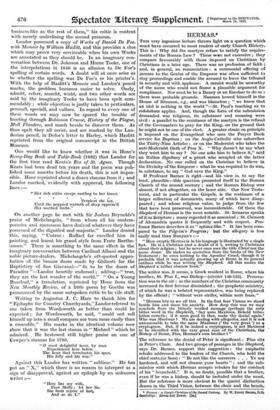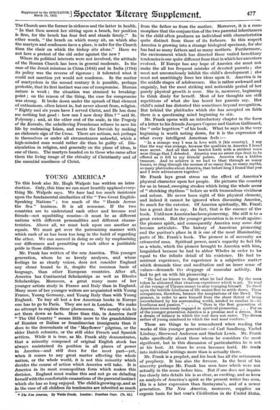HERMAS.*
This very ingenious lecture throws light on a question which must have occurred to most readers of early Church History.
This is : Why did the martyrs refuse to satisfy the require. ments of the Roman Law ? These we not excessive ; they-
compare favourably with those imposed on Christians by Christians in a later age. There was no profession of faith ; and, in general, no renunciation : a ceremonial offering of incense to the Genius of the Emperor was often sufficient to stay proceedings and enable the accused to leave the tribunal in security and with applause. A casuist would be unworthy of the name who could not frame a plausible argument for compliance. Nor need he be a Benny or an Escobar to do so :
there were probable grounds. Naaman bowed himself in the House of Rimmon, e.g., and was blameless ; " we know that an idol is nothing in the world "—St. Paul's teaching as to eidolothuta applies. And, though the form of the submission
demanded was religious, its substance and meaning were civil : a parallel to the resistance of the martyrs is the refusal of the Covenanters to pray for the King, on the ground that he might not be one of the elect. A greater strain on principle is imposed on the Evangelical who uses the Prayer Book service for Baptism ; on the Anglo-Catholic who subscribes the Thirty-Nine Articles "; or on the Modernist who takes the anti-Modernist Oath of Pius X. " Why doesn't he say what they want him to say ? No one asks him to believe it," said an Italian dignitary of a priest who scrupled at the latter declaration. No one called on the Christian to believe in the Divinity of the Emperor : what he was required to do was, in substance, to say " God save the King."
If Professor Barnes is right—and his view is, to say the least, plausible—this question presented itself to the Roman Church of the second century ; and the Roman Bishop was
almost, if not altogether, on the taxer side. Our New Testa- ment, and in particular the dospels, is the residuum of a
larger collection of documents, many of which have disap- peared ; and whose religious value, to judge from the few that have been preserved, was inconsiderable. Of these the
Shepherd of Hermas is the most notable. St. Irenaeus speaks of it as Scripture ; many regarded it as canonical ; St. Clement of Alexandria quotes it frequently and with respect. Pro- fessor Barnes describes it as " sphinx-like." It has been com- pared to the Pilgrim's Progress; but the allegory is less easily read than Bunyan's :— " How cryptic Hermas is in his language is illustrated by a single fact. He is a Christian (not a doubt of it !), writing to Christians about their religion ; but he never once uses the title Christ nor the name Jesus. He makes no quotation from the books of the New Testament ; he owes nothing to the Apostles' Creed, though it is probable that it was actually growing up at Rome in its general outlines while he was writing the Shepherd. All this makes the Shepherd a rather obscure book."
The writer was, it seems, a Greek resident in Rome, where his brother, St. Pius I., was Bishop—(eireiter 140-155). Persecu- tion was in the air : as the-numbers of the Christian community
increased its first fervour diminished ; the prophetic ministry, of which he was a belated representative, was being replaced by the official ; " without were strifes, within were fears."
"Hermas lets us see all this. In the first four Visions we stand beside him and share his anxiety. How deep this was we may conclude from the bitterly worded message (perhaps the only bitter word in the Shepherd), Say unto Maximus, Behold tribu- lation cometh : if it seem good to thee, make thy denial again.' Who was Maximus We are dealing. with allegories, and it is not unreasonable to take the name Maximus (' the very great ') as q cryptogram. But, if it be indeed a cryptogram, is not Maximus to be identified with the very great man of the Christians, the Bishop of Rome, Pius, Hermas's own brother " The reference to the denial of Peter is significant : Pius sits in Peter's Chair. And two groups of passages in the Shepherd, says Dr. Barnes, support this suggestion : the emphatio rebuke addressed to the leaders of.the Church, who hold the chief seats_(or Sees) : ". Be not like the sorcerers . . . Ye are hardened, and will not cleanse your hearts " ; and -the:sub. mission with which Hermes accepts rebukes for the conduct of his " household.", It is, no doubt, possible that brother, even if he was a. bishop, should be included under the word. But the reference is more obvious in the quaint distinction
drawn in the_Third Vision, between the chair and the bench.
* Hennas : a Simple Christian of the Second Century. By W. Emery Barnes, AB, Cambridge Bowes and Bowes. [la)
The Church uses the former in sickness and the latter in health. " In that thou sawest her sitting upon a bench, her position is firm, for the bench has four feet and stands firmly." In other words, " the bench on which many. sit, on which also the martyrs and confessors have a place, is safer for the Church than the chair on which the bishop sits alone." Have we not here a protest of the old order against the new ?
Where its political interests were not involved, the attitude of the Roman Church has been in general moderate. In the case of the Jesuit missions in China (1645) and in India (1704) its policy was the reverse of rigorous ; it tolerated what it could not sanction yet would not condemn. In the matter of martyrdom in the second century it is possible, perhaps probable, that its first instinct was one of compromise. Human nature is weak ; the situation was strained to breaking- point ; on the reason of the thing, the case for compromise was strong. It broke down under the uprush of that element of enthusiasm, often latent in, but never absent from, religion.
Eighty and six years have I served Christ, and He has done me nothing but good : how can I now deny Him ? " said St. Polycarp ; and, at the other end of the scale, in the Tragedy of the Korosko, the unbelieving Frenchman refuses to save his life by embracing Islam, and meets the Dervish by making an elaborate sign of the Cross. There are actions, not perhaps in themselves or under all circumstances unlawful, which a high-minded man would rather die than be guilty of. Dis- simulation in religion, and generally on the plane of ideas, is one of them. The martyrs handed on to those who came after them the living image of the chivalry of Christianity and of the essential manliness of Christ.



































































 Previous page
Previous page